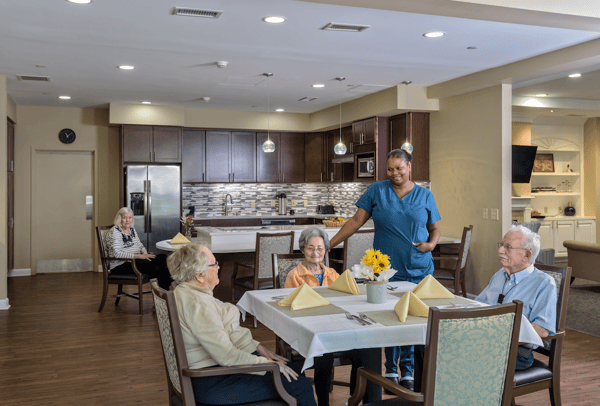Guilt can paralyze the decision-making of people who are struggling to care for loved ones who are living with Alzheimer’s disease or other forms of dementia. While battling that guilt, some struggle to provide care, even quitting their jobs, because they see it as a betrayal to place their parent or spouse in a nursing home that provides memory care, personal care, or other assistance they need.
Fortunately, that guilt and worry can be greatly unfounded, as Jen McPherson has written in The Guardian. Here's what Jen had to say about her Dad's experience after moving into a retirement community: "My father came alive again and went back to his jovial, intellectually curious self. Every time I visited him, he walked around with his walking stick or frame, in high spirits."

Episcopal Retirement Services’ own Hannah McCarren, a memory support household coordinator, says she often sees the unwarranted guilt and worry family members experience. “They worry about their loved one being upset about a move to a retirement community and thinking that they'll hate them forever.’”
Many people very much enjoy their new living arrangements once they overcome the transition of living in a new environment. Most make new friends – some of them new best friends. Instead of their loved one having a grudge because of their new home, many are thankful after a transition period. And family members no longer struggle to provide support. Instead, they can focus on enjoying being sons, daughters, or spouses again.
“The transitions in life can be difficult, but sometimes they are needed for everyone. More times than not, over time, everyone settles in and can see the benefits additional care and support,” Hannah said.
Here’s Jen McPherson’s article in The Guardian.
You can be assured that top-notch memory care communities are out there. And families should know that if they research the community's quality standards and which ones best suit their loved ones, they can have a positive experience.
The best advice is to plan in advance. It’s far better to research memory care options before care needs change or a medical crisis happens. Making quick decisions often causes regret because you didn’t have time to research the options. Planning ahead can also help with the guilt by having a sound strategy for your loved one.
Here’s a blog about 5 Questions to Ask When Choosing a Memory Care Community.
If you're interested in Memory Care in the Louisville area, click below to learn about an option for you:













